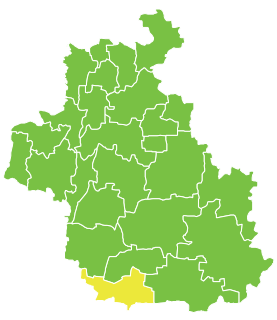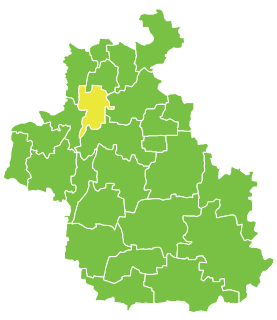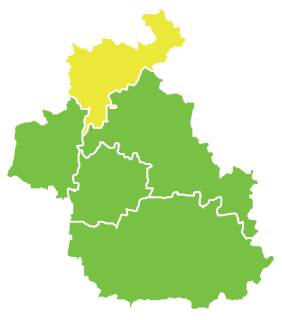
Salqin is a town in Syria, administratively part of Idlib Governorate. Nearby localities include Kafr Takharim to the southeast, Abu Talha to the south, Dalbiyah to the southwest, al-Alani to the northwest and Isqat to the northeast. Salqin is the center of its nahiya (subdistrict). It had a population of 23,700 in 2004. Its inhabitants are predominantly Sunni Muslims, although there is also a small Alawite community.

Abu Talha is a village in northwestern Syria, administratively part of the Idlib Governorate, located northwest of Idlib near the border with Turkey. Nearby localities include Azmarin to the south, Armanaz to the east, Salqin to the north and Dalbiyah to the northwest. According to the Syria Central Bureau of Statistics, Abu Talha had a population of 1,087 in the 2004 census.

Kafr Takharim is a town in northwestern Syria, administratively part of the Idlib Governorate, located in the north of Idlib. Nearby localities include Harem to the north, Salqin to the northwest, Abu Talha to the west and Armanaz to the south. According to the Syria Central Bureau of Statistics, Kafr Takharim had a population of 10,084 in the 2004 census. The town is also the administrative center of the Kafr Takharim nahiyah which consists of nine villages with a combined population of 14,772. Its inhabitants are predominantly Sunni Muslims.

Saraqib Nahiyah is a Syrian Nahiyah (Subdistrict) located in Idlib District in Idlib. According to the Syria Central Bureau of Statistics (CBS), Saraqib Nahiyah had a population of 88076 in the 2004 census.

Khan Shaykhun Nahiyah is a Syrian Nahiyah (Subdistrict) located in Maarrat al-Nu'man District in Idlib. According to the Syria Central Bureau of Statistics (CBS), Khan Shaykhun Nahiyah had a population of 50469 in the 2004 census.

Kafr Takharim Nahiyah is a Syrian Nahiyah (Subdistrict) located in Harem District in Idlib. According to the Syria Central Bureau of Statistics (CBS), Kafr Takharim Nahiyah had a population of 14772 in the 2004 census.

Armanaz Nahiyah is a Syrian Nahiyah (Subdistrict) located in Harem District in Idlib. According to the Syria Central Bureau of Statistics (CBS), Armanaz Nahiyah had a population of 27267 in the 2004 census.
Betiya is a Syrian village located in Salqin Nahiyah in Harem District, Idlib. According to the Syria Central Bureau of Statistics (CBS), Betiya had a population of 683 in the 2004 census.
Bozanti, Idlib or Bazinta is a Syrian village located in Salqin Nahiyah in Harem District, Idlib. According to the Syria Central Bureau of Statistics (CBS), Bozanti, Idlib had a population of 98 in the 2004 census.
Delbiya is a Syrian village located in Salqin Nahiyah in Harem District, Idlib. According to the Syria Central Bureau of Statistics (CBS), Delbiya had a population of 1204 in the 2004 census.
Ein Elbikara is a Syrian village located in Salqin Nahiyah in Harem District, Idlib. According to the Syria Central Bureau of Statistics (CBS), Ein Elbikara had a population of 969 in the 2004 census.
Foziyeh is a Syrian village located in Salqin Nahiyah in Harem District, Idlib. According to the Syria Central Bureau of Statistics (CBS), Foziyeh had a population of 171 in the 2004 census.
Hamziyeh is a Syrian village located in Salqin Nahiyah in Harem District, Idlib. According to the Syria Central Bureau of Statistics (CBS), Hamziyeh had a population of 953 in the 2004 census.
Kafarna is a Syrian village located in Salqin Nahiyah in Harem District, Idlib. According to the Syria Central Bureau of Statistics (CBS), Kafarna had a population of 266 in the 2004 census.
Kafr Hind is a Syrian village located in Salqin Nahiyah in Harem District, Idlib. According to the Syria Central Bureau of Statistics (CBS), Kafr Hind had a population of 1073 in the 2004 census.
Kafrahlat Jallad is a Syrian village located in Salqin Nahiyah in Harem District, Idlib. According to the Syria Central Bureau of Statistics (CBS), Kafrahlat Jallad had a population of 233 in the 2004 census.
Hir Jamus Saghir is a Syrian village located in Salqin Nahiyah in Harem District, Idlib. According to the Syria Central Bureau of Statistics (CBS), Hir Jamus Saghir had a population of 432 in the 2004 census.
Saidiyeh, Idlib is a Syrian village located in Salqin Nahiyah in Harem District, Idlib. According to the Syria Central Bureau of Statistics (CBS), Saidiyeh, Idlib had a population of 1050 in the 2004 census.
Al-Tlul is a Syrian village located in Salqin Nahiyah in Harem District, Idlib. According to the Syria Central Bureau of Statistics (CBS), Al-Tlul had a population of 1703 in the 2004 census.








